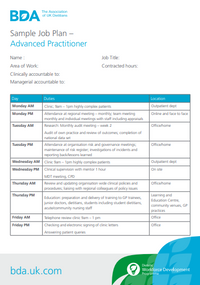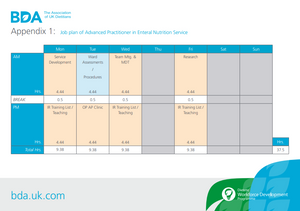What is a Job Plan?
“A job plan is a prospective, professional agreement describing each employee’s duties, responsibilities, accountabilities and objectives. It describes how an employee’s working time will be used according to the specific categories of direct clinical care (DCC), specified supporting professional activities (SPA) and other activities such as additional NHS responsibilities (ANR) and externally funded duties (ED).” Job planning the clinical workforce – Allied Health Professionals, A best practice guide, July 2019.
Why is a job plan required?
From an Advanced Practice perspective - all 4 pillars of practice should be covered once the Advanced Practitioner is fully qualified.
- Clinical Practice – complex caseload
- Leadership and Management
- Learning and Education – this would include own CPD and maintaining capabilities as well as training of colleagues, less experienced staff and the wider MDT where relevant
- Research and Evidence Based Practice
Job planning is probably more critical in the Advanced Practice role than in a typical clinical role. In an Advanced Practice role, changing models of care delivery and ensuring it meets patient/client needs is essential. Designated time must be set aside, and protected, to ensure the Advanced Practice role meets its function. The job plan allows the Advanced Practitioner to evidence how they are working across the 4 pillars and having this agreement with the employer protects this. If you are only working clinically then it’s not an Advanced Practice role.
For trainee Advanced Practitioners dedicated non-clinical time is required for:
- study at university
- supernumerary to enable the clinician to develop new clinical skills. This may continue post qualification but to a lesser extent.
Minimum standard for the Advanced Practice job plans
- Clearly identified Clinical, Research and evidence based practice, Leadership and Management and Facilitated Learning time
- Work duties then allocated to direct clinical care (DCC), supporting clinical activities (SPA), additional NHS responsibilites (ANR) and externally funded duties (ED) time
- Clearly identified job banding and hours of work and post identification
- Staff full name
- All time accounted for and how much time the employee is expected to be available for work
- Clearly identified objectives and supporting resources
- Location of planned activity (inpatients, outpatient clinics, community/domiciliary, private clinics)
- Specialty/service line of planned activity
- Outcomes that the job plan is expected to deliver.
The job plan should be reviewed as part of the appraisal process and as a minimum on an annual basis, to ensure it continues to meet the needs of the service and the practitioner.
Examples

Download our example job plan.


